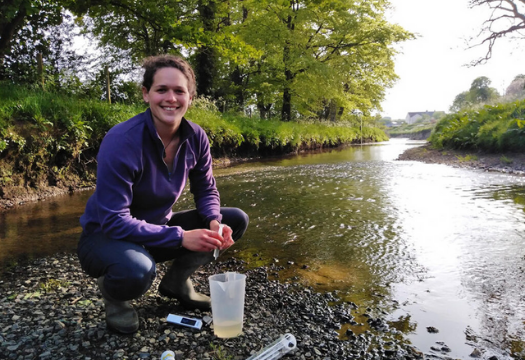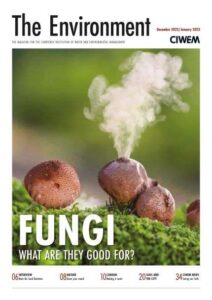“Volunteering can be a wonderful way for any environmentalist to break into the conservation sector; it worked for me.”
Lydia Ashworth – Westcountry Rivers Trust’s Westcountry Citizen Science Investigations Coordinator shares her passion for community engagement with CIWEM’s The Environment magazine.
“Before working for the Westcountry Rivers Trust, I volunteered in its water quality monitoring scheme, Westcountry Citizen Science Investigations (CSI). I don’t doubt my active interest in the programme, and my willingness to get involved helped me to bag my job.
“The practical experience it gave me along with the confidence and belief that I could thrive on my chosen career path have been invaluable in applying for a permanent role.
“As a charity, WRT relies on donations and project funding to carry out vital river restoration and conservation work – if the money runs out, the work can stop.
“With Westcountry CSI, even after the initial project funding ended, the team made sure the work carried on.
“The project started in 2016 in the Tamar catchment, funded by a small National Lottery grant. Project manager Simon Browning (who now works for the river trust network’s national body The Rivers Trust to build on our flagship Westcountry CSI programme nationally) based the idea for the project on Earthwatch’s Freshwater Watch.
“As Freshwater Watch runs on an international scale, Simon felt it was possible for it to miss local intricacies and saw that adaptions could be made to get the most out of a citizen science scheme in the Westcountry.
“When I joined WRT in November 2019, I spent half my time on Westcountry CSI with the aim of seeing where it could go with more staff time dedicated to it.
“At that point, we had around 67 active volunteers, with 130 volunteers contributing surveys since the project start in 2016 and 2,717 surveys submitted in total.
“The survey considers the surrounding landscapes, wildlife, plants, visible pollution, and channel dimensions before asking the volunteer to carry out simple water tests for turbidity, phosphate, dissolved solids and temperature. It is designed to capture overall river health and to spot trends that develop over time.
“My focus at the start was to bolster the retention of our valued volunteers. I found communication and feedback vital to a volunteer’s motivation, with simple steps such as reinstating a regular newsletter, promptly replying to emails, giving survey responses, and regularly posting on the Facebook group my initial goals.
“Gaining momentum does take time. But of course, no one expected the pandemic. We quickly found that Westcountry CSI had an adaptability we hadn’t previously tapped into.
“Engaging with volunteers online through webinars and group chats created a new avenue and allowed us to get citizen scientists together from across the large area that we cover – Cornwall, Devon, Somerset and Dorset – an almost impossible task in person.
“It also opened our eyes to the health and wellbeing benefits people gained from simply walking down to their rivers and carrying out a survey.
“I think this was a big driver in the boost in participation we saw following the first lockdown. Of course, the other driver was the state of our rivers.
“The release of the 2019 Water Framework Directive (WFD) results prompted many to open their eyes to the health of their rivers and ask how they could make a difference.
“Presenting evidence is the first step to understanding and bringing about change. Cuts to statutory monitoring have meant that there has been a steady reduction in Environment Agency sampling on our rivers. What we are witnessing is people stepping in to fill those gaps with a passion and drive that comes from loving their local environment, including their rivers.
“Being a charity that aims to inspire a love for and understanding of freshwater environments, it has been heart-warming to witness this upwelling of concern.
“We now have 329 active volunteers, 567 volunteers who have taken a survey since the start of the scheme and 9,452 surveys submitted up to August 2022.
“Westcountry CSI is an ever-evolving project. It is important to listen to volunteers and make adaptions where necessary. We want the scheme to be available to all who want to take part while still giving us the data and information that will be valuable in understanding the Westcountry’s waterways.
“The CSI sampling kit costs us £30 to put together, which is often covered by donations kindly made by the volunteers. It is easy to use, and, for most, no formal training is required.
“More recently, we have noticed a rise in group participation. Local parish councils, climate and nature groups and friends of groups have come to us with a desire to improve and enhance their local areas and hold polluters to account.
“I will often run a training event where there are many volunteers who wish to start at the same time. This helps to create connections and share knowledge and understanding, which are key building blocks for group activity.
“It also allows me to meet some of the people who are taking part in the scheme. Nothing beats a conversation with passionate community members over a cup of tea in a village hall or even sitting in their kitchen with my laptop to hand.
“We are seeing a radiating effect from the groups that not only encourages further participation, but also sees these groups gain funding and influence in their areas. We often talk about resilience for nature and climate, and I can only see huge benefits in years to come, in local communities taking stewardship of their natural resources.
“As you can imagine, Westcountry CSI produces a large dataset. We encourage volunteers to sample monthly and people often take on more than one site in their catchments. They input their data onto Cartographer, which is the online platform we use for the surveys.
“Volunteers can view everyone’s data on an interactive map. However, to start seeing meaningful trends and results the data needs analysing. When I started, I introduced visual ways of representing the survey findings, which helped bolster our volunteers’ interest and drive.
“At the end of 2020, we devised a method to analyse all the data collected for water bodies that contained 12 or more sample points. This resulted in the first annual Westcountry CSI scorecards. It saw 25 waterbodies getting an overall health score from the data collected from our volunteer citizen scientists.
“In 2021, we produced 74 scorecards, highlighting the remarkable interest from Westcountry citizens in understanding their rivers and streams.
“As we develop Westcountry CSI, communication is key, not only do we need to talk to those that are collecting the data but also those that may use the data produced.
“Being prescriptive about sample points, working on a smooth induction and ensuring a strict quality assurance method are just some of the ways we can ensure reliable, usable data.
“Our supported Westcountry CSI volunteer experience is key to how the scheme moves forward. Encouraging groups to act as long-term caretakers for their rivers, filling sample point gaps within the local community and enabling a platform for discussion and knowledge exchange allows for independent resilience too.
“We are at a crucial juncture along the pathway of citizen-led data. Our degrading natural environments need the help of the communities that rely on them for basic provisions.
“Whether you believe that data should be collected by statutory bodies or not, the reach of citizen science cannot currently be matched by them. Long term consistent data is needed to understand and improve our freshwater ecosystems and if the government won’t do it, then we will.”
We want to thank Lydia for her dedication to our flagship citizen science project as she is heading on to a new role on 7 December. This feature will hopefully serve as a great reminder of her time with our charity.



Amazing work. As someone who grew up on the River Camel in N Cornwall, I’ve seen (and smelt) the quality in the water decline in over the years. Sadly, as someone who would regularly jump in for a swim I now think twice. Happy to get involved as I can easily monitor the one section of the Camel and Ruthern I live on.
Hi Simon, it would be great if you would like to get involved in helping to monitor and protect your local waterways. Here is the link to our CSI page if you would like to sign up to become a CSI volunteer: https://wrt.org.uk/westcountry-csi/
All help is greatly appreciated and thank you for caring about our rivers.
Best wishes,
Ella